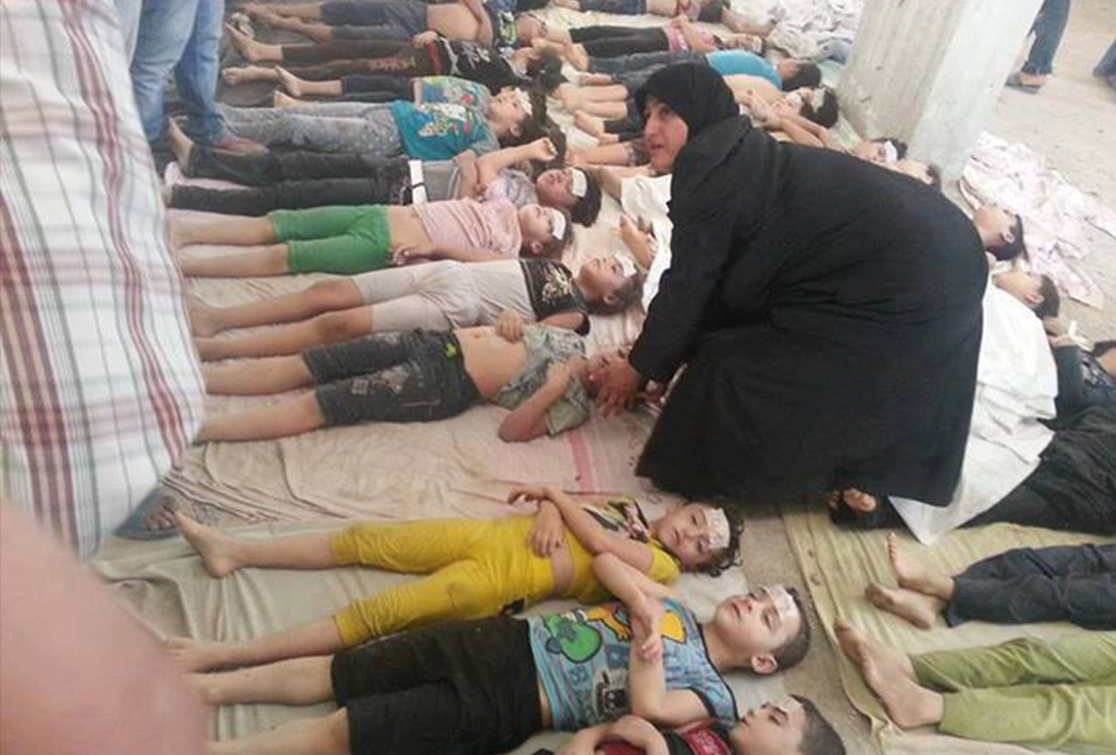
Written by Abdul Wahab al-Khateeb
On August 21, 2013, the world caught a glimpse behind the mask of the monstrous murder Bashar al-Assad when his forces launched a devastating chemical weapons attack on the people of Ghouta, near the capital city of Damascus. Today marks the 10 year anniversary of this tragic event, it is essential to reflect on the horrifying impact it had, ending the lives of nearly 1,400 innocent civilians. The attack not only shocked the world but also prompted international condemnation and calls for justice. Calls, which to this day, have not been heeded as “Chemical Assad” continues to oppress, torture, attack, terrorize and murder millions of Syrians unchecked.
That day the regime carried out a series of chemical weapons attacks in Ghouta, primarily involving Sarin gas, a deadly nerve agent. The toxic gas, known for its lethal effects, was unleashed on residential areas, resulting in widespread panic and chaos. The attack targeted densely populated areas, leaving civilians, including children, women, and men, in a state of utter devastation it was the most devastating confirmed use of chemical weapons against civilians since the 1988 Iraqi attack on the Kurdish village of Halabja.
According to various reports, the 2013 Ghouta chemical weapons attack killed over a thousand civilians and left countless others injured. The exact number of casualties is difficult to assess due to the challenges in collecting accurate data in a war-torn region. However, estimates suggest that at least 1,300 civilians were murdered, with over 10,000 suffering from severe injuries.
Among the victims, at least two-thirds were women and children. While the indiscriminate nature of the attack spared no one, leaving families torn apart and communities shattered, it was targeted in densely populated residential areas at night to ensure the highest number of causalities. The loss of innocent lives, particularly those of children, remains a haunting reminder of the horrors the Assad regime inflicted upon the Syrian people.
The international community, including the UN, was quick to condemn the attacks. The UN Secretary-General at the time, Ban Ki-moon, expressed deep concern over the use of chemical weapons and called for an immediate investigation into the incident. The UN Security Council held emergency meetings to discuss the attack and its implications for international peace and security.
In the aftermath of the attack, a UN investigation team was deployed to Syria to gather evidence and determine the responsible parties. The team’s findings, released in September 2013, confirmed the use of Sarin gas and concluded that the attack constituted a war crime.
While the US said that it condemned “the strongest possible terms any use of chemical weapons anywhere, by anyone, under any circumstances,” saying that “There can be no impunity for those who use chemical weapons,” neither the US nor the UN took any substantial actions to safeguard the lives of the Syrian people or ensure the regime was incapable or unwilling of carrying out further atrocities. In fact, since the Ghouta attacks Assad used chemical weapons in at least 85 other attacks in Ltamenah, Douma, Khan Shiekoun and Qaboun, and has been implicated in over 300 chemical attacks in Syria.
Despite claims of condemnation, efforts to bring the Assad regime to justice have faced numerous challenges not least of which is the obstruction of Assad’s ally Russia, whose president Putin is accused of war crimes in Syria and Ukraine.
The 2013 Ghouta chemical weapons attack stands as a tragic chapter in the Syrian conflict and a blight on the communal human rights record of the international community; it has irrevocably changed the lives of thousands of Syrians. As we commemorate the 10th year anniversary, it is crucial to renew our commitment to preventing the use of chemical weapons and ensuring that those responsible for such heinous acts are held accountable. May the memory of the victims serve as a reminder of the urgent need for peace and justice in Syria and beyond.









